Dentures – Plymouth, MA
Functional, Natural-Looking Tooth Replacement
Since they were first used centuries ago, dentures have evolved by leaps and bounds. The dentures of today are more comfortable and functional than ever before. They are one of the most popular ways to replace lost teeth! At Aveni Dental Professionals, we offer multiple types of dentures in Plymouth. Learn more about them on this page, and get in touch with us when you would lie to schedule your personal restorative dentistry consultation.
Why Choose Aveni Dental Professionals for Dentures?
- Experienced restorative dental team
- Natural-looking, comfortable results
- Traditional and implant dentures available
Who Is a Good Candidate for Dentures?

Do you struggle with the effects of missing teeth? Perhaps you find it difficult to eat your favorite foods, and you may feel embarrassed to smile. Your speech may not be as clear as it once was. Dentures can address such issues. They are particularly suited to people who have suffered the loss of several teeth or all of their teeth, rather than just one or two teeth. When you visit us for a consultation, we will verify whether or not dentures are a good choice for you.
Effects of Missing Teeth

Whether you are missing teeth due to gum disease, decay, or injury, your situation may have some significant consequences for your health and quality of life:
- Decreased chewing ability. You might not be able to eat your favorite foods. You could also have a limited diet that does not provide you with sufficient nutrients.
- Poor facial aesthetics. Missing teeth can cause your teeth to look sunken and give you a disproportionate smile.
- Social isolation. Due to self-consciousness about missing teeth, some people shy away from healthy social interactions.
Fortunately, dentures may be able to help you deal with all such issues so you can enjoy improved overall wellness.
What Qualifies You for Dentures?

Dentures might be right for you if:
- You are missing all or most of your teeth throughout a dental arch. If you are missing just one or two teeth, a different treatment may be more suitable.
- Your gums and jawbone are healthy. If you have gum disease or other significant oral health problems, they should be addressed before you get dentures.
- You have good habits. You should be committed to keeping your denture in good shape via thorough oral hygiene and other practical steps.
Alternative Tooth Replacement Options

If dentures are not right for you, we might recommend an alternative tooth replacement option:
- A dental bridge. A traditional bridge relies on the remaining natural teeth for support. It can usually replace 1 – 3 teeth in a row and is a great option for people who want a sturdy, cost-effective way to recomplete their smile.
- Dental implants. Dental implants are prosthetic tooth roots that get surgically placed in the jawbone. They can provide an incredibly strong base of support for crowns, bridges, and dentures. The many benefits they offer have earned them a reputation as the best form of tooth replacement.
Types of Dentures
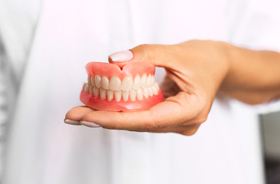
When you visit us as your dentist in Plymouth for a consultation, we will let you know what type of denture we believe is best for you. Our recommendation will be based on the extent of your tooth loss, the health of your gums and jawbone, and your goals for treatment. Here is a brief overview of the three types of dentures that we offer:
Partial Dentures

A partial denture replaces multiple teeth at various places throughout a dental arch. You can think of it sort of like a puzzle piece that fits in exactly where it is needed. It may have small metal attachments that connect it to the nearby natural teeth and help it to stay stable during speaking and eating.
Full Dentures
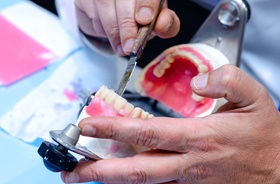
A full denture replaces an entire arch of lost teeth. It consists of a gum-colored base that supports a row of artificial teeth, which are usually constructed out of acrylic of porcelain. A mild adhesive or natural suction helps a full denture to remain secure in the mouth during eating and speaking.
Implant Dentures

Dental implants are prosthetic tooth roots, which are placed in the jawbone during a minor surgery. They provide an extremely sturdy base of support for a denture. Implant dentures are much stronger and longer-lasting than traditional full and partial dentures. They even stimulate the jaw and help to prevent bone loss.
How Dentures Are Made
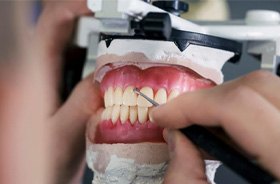
After you decide to move forward with dentures, you can start looking forward to a beautiful and functional smile! Before you get to that point, though, your dentures will need to be custom-made for your unique mouth. What is involved in crafting a prosthetic that is a perfect fit for you? Below, you will find an overview of the denture creation process. What you discover might just heighten your appreciation for your new set of teeth!
What Are Dentures Made Of?
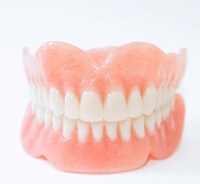
Dentures have two main parts:
- The base of dentures is the gum-colored portion of each prosthetic. Usually, it is made of acrylic, although in some cases, nylon or resin is used instead. For partial dentures, the base includes small metal or acrylic clips that are designed to wrap around a patient’s remaining natural teeth.
- The teeth of dentures are often made of acrylic or porcelain. Acrylic is softer, so it is often the material of choice for patients who still have some of their natural teeth. It is less likely to cause premature wear and tear on natural enamel. Porcelain, on the other hand, is usually favored for full-mouth tooth replacement due to its strength and durability.
The Denture Creation Process
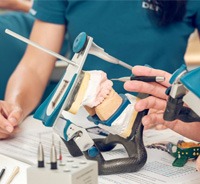
The denture creation process involves several steps. Here is a basic overview of how it works:
- Our team takes detailed impressions of your mouth. We use impression trays and a special putty material to capture an accurate representation of your dental arches. We may also take some measurements of your jawbone.
- A lab creates a wax-up. After we send the impression of your mouth to a laboratory, they will create a wax model of your gumline. Then, they can use a machine called an articulator to place artificial teeth in the model.
- You come in for a fitting. The lab sends us the wax-up of your dentures, and we can use those to evaluate their fit. We continue to coordinate with the lab until they deliver your final restoration.
- You receive your beautiful new prosthetic. When your final dentures are ready, you will come back to see us. We might have to make a few minor adjustments to your prosthetic during your appointment. Then, you can go off and start adjusting to your smile.
Adjusting to Your New Dentures

It can take a bit of time to adjust to new dentures. At first, your new teeth might feel uncomfortable in your mouth. You might even experience some mild soreness, as well as a bit of difficulty when you eat and speak. With time and practice, though, your dentures should begin to feel like a natural extension of your body. If you ever experience severe pain or other serious problems with your prosthetic, give us a call. We will do all we can to assist you.
Benefits of Dentures

If you have multiple missing teeth, you may find it difficult to carry out a number of daily tasks, such as eating and speaking clearly. You may even hesitate to smile in public due to concerns about your appearance. Dentures can be truly life-changing! They offer many benefits that can support your overall wellness and improve your daily quality of life. Continue reading below to learn about some of the specific advantages offered by this form of tooth replacement.
Psychological Benefits

Some people with tooth loss find it difficult to accept the reality of their situation. They may suffer from reduced levels of self-confidence and even depression. Social isolation is also common among such individuals.
If tooth loss is adversely affecting your mental health, dentures may be able to help. They have the potential to restore your confidence in your appearance and motivate you to spend more time around other people. You may find that it is easier for you to engage in small talk, eat meals in a social setting, and more. You could even feel like taking your significant other on dates!
Clearer Enunciation

Clear speech depends on complex interactions between the teeth and tongue. Missing teeth, therefore, can make it more challenging to enunciate certain sounds. You might be reluctant to engage in conversations with others.
When you first get dentures, you might have a slight lisp. Once you adapt to your prosthetic, however, you should be able to speak with clarity and confidence. Most people are speaking easily within a few weeks or months of getting their denture.
Improves Nutrition

Without teeth, you may gravitate toward soft foods, which could deprive you of the enjoyment and nutrition that can be gained from tougher options. For example, you may not be able to eat fresh veggies and tasty grilled meats.
Dentures can restore your ability to eat most foods. With a few slight adjustments to your eating techniques, you should be able to enjoy almost any snack or meal with ease.
Preserves Oral Health

If you still have some of your natural teeth, dentures can protect them in a couple of ways:
- Dentures can serve as a placeholder that prevents your natural teeth from drifting out of place. This can preserve your bite and potentially reduce the risk of future tooth loss.
- Dentures can allow you to distribute food evenly across your mouth, which can reduce wear and tear on your natural teeth.
Expands Opportunity

Your smile can make a powerful first impression. Unfortunately, tooth loss may make it difficult for you to accurately convey your beautiful personality when you are attending job interviews, pursuing promotions, or selling services to clients. In fact, one study published in 2019 found that the probability of being employed was negatively correlated with tooth loss.
Dentures can replace your lost teeth and send the signal to other people that you have excellent oral health. Plus, an attractive smile can make you seem both approachable and successful.
Understanding the Cost of Dentures
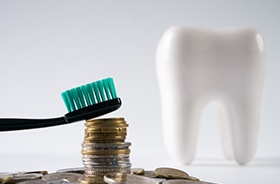
We will give you an estimate for the price of your prosthetic when you visit us for your consultation. The cost of dentures in Plymouth depends on a few factors, including the type of denture you will receive; the materials used to make your denture; and how your insurance policy applies to your treatment. If you do not wish to pay for the entirety of your denture upfront, we can help you apply for low-interest financing through CareCredit, which will allow you to break up the cost of your treatment into manageable monthly installments.
Factors that Affect the Cost of Dentures

Some of the biggest factors that affect the cost of dentures include:
- Type of denture. Full dentures, partial dentures, and implant dentures all have different price points.
- The base of a denture is made out of acrylic, and the teeth can be made of acrylic or porcelain. The specific type and brand of materials used have a bearing on overall price.
- Preparatory treatments. Some patients must undergo extractions or other treatments before they can receive dentures. Each of these preliminary services has its own cost.
Be wary of “bargain” dentures. They might have an attractively low price, but the quality may not be what you were hoping for.
Are Implant Dentures More Expensive?
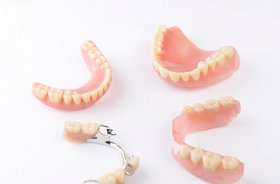
Yes, implant dentures in Plymouth cost more upfront than traditional dentures. The reason for the difference is simple: the extra time, effort, and materials involved in providing implant dentures require an increase in price. However, it is important to think about cost versus value. A traditional denture may last 5 – 7 years before replacement becomes necessary, but implant dentures tend to last much longer. Implant dentures also offer priceless oral health benefits, such as jawbone preservation, that traditional prosthetics simply cannot provide. The vast majority of patients who choose implant dentures are happy about their decision.
Does Dental Insurance Cover Dentures?
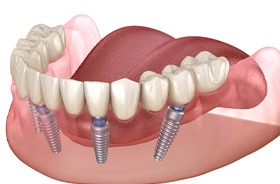
Most dental insurance policies consider dentures to be a major procedure and are willing to cover about 50% of their cost, up to the amount of a plan’s annual maximum. For many patients, this means their out-of-pocket cost is reduced by hundreds of dollars or more. Our team are experts at navigating insurance, and we are in-network with some of the most popular plans. We will be happy to help you understand your benefits and file your claims.
Other Options for Making Dentures Affordable

As your denture dentist in Plymouth, we want you to be able to afford your prosthetic. To that end, we offer a few useful provisions:
- Essential Dental Plan. This discount plan, designed for patients without insurance, provides lower prices on virtually all of our services.
- We are partnered with CareCredit, a third-party lender, to offer low-interest and no-interest monthly payment plans. Most patients who apply are approved for credit
Are you ready to learn more about dentures and their cost? Contact us today to schedule a consultation with the team at Aveni Dental!
Dentures Aftercare

After you receive your dentures, you can expect to enjoy many benefits. However, those benefits will only last if you take reasonable measures to care well for both your mouth and your prosthetic. One important thing you should do is schedule regular dental visits. During these appointments, your care team can examine your prosthetic and your mouth, recommend any necessary treatments, and provide personalized advice on how you can get the most out of your dentures. Remember, certain changes to your oral health can be difficult to notice on your own, especially in their early stages. Having a professional eye check out your smile can spare you from big problems down the road!
Beyond visiting your dentist, what else can you do to take good care of your prosthetic? Here are some helpful tips:
Removable Dentures

Remove After Eating
It is a wise practice to remove your dentures after each meal and rinse them off. Doing so can remove food debris, reduce plaque formation, and help your smile stay fresh throughout the day. Just remember — do not use hot water to rinse or clean your dentures. The high temperature could warp them and cause them to lose their custom fit. Instead, use cool or lukewarm water.
Clean Your Restoration
You should thoroughly clean your dentures at least once a day. Use a soft brush and soap that is mild, unpigmented, and unscented. (You should never use regular toothpaste on dentures because it is too abrasive.) Scrub all of your prosthetic’s surfaces to remove plaque and food particles. Thoroughly rinse your dentures before wearing them again; you do not want soapy residue in your mouth!
Keep Your Dentures Safe
Dentures are durable, but they are also somewhat delicate. The last thing you want is to accidentally break them! To reduce the risk of damage, you should:
- Handle your dentures carefully. When you take them out of your mouth, it is best to do so over a folded towel or a sink full of water. They should have a soft landing if you accidentally drop them.
- Keep them somewhere safe. Do not store your dentures where they could easily be accessed by small children or curious pets.
Remove When You Sleep
You should not sleep while wearing your dentures. Keeping them in your mouth 24/7 could increase your risk of gum irritation, bad breath, and infections. In contrast, removing them at night can allow your gums to breathe and encourage good circulation. It also gives you a chance to thoroughly clean them. Soaking them in a cleansing solution overnight can do much to fight bacterial buildup. Submerging them in liquid is also important for preventing them from drying out and losing their shape.
Notice Changes
It is always advisable to monitor your oral health and your dentures. Take note of any changes. For example, you might notice that your dentures’ fit has changed or that you are experiencing some oral irritation. These are things to bring up with your dentist during your next appointment. Or, if the problem is particularly bothersome, you might need to request an emergency visit. Your dentist may be able to adjust your dentures or provide other services to help you get back to fully enjoying your prosthetic.
All-on-4 Dentures
Caring for All-on-4 dentures is different from caring for traditional dentures. In fact, because All-on-4 dentures are permanently fixed in the mouth, maintaining them is almost like taking care of natural teeth! You should be sure to brush with a non-abrasive toothpaste twice a day. You should also clean underneath your dentures using a water flosser or sulcus brush. Rinsing with antibacterial mouthwash can help to get rid of dangerous microbes.
Denture FAQs

Dentures in Plymouth offer a reliable and cost-effective way to replace lost teeth. If you would like to find out whether they are right for you, we invite you to come to us for a personal consultation. In the meantime, you can learn more about this treatment by reading the answers to some frequently asked questions about it. Make notes about anything you would like further explanation on — our team will be happy to share our knowledge!
How Long Will You Have to Wait to Get Dentures After Your Teeth are Pulled?
The denture process varies from patient to patient. On average, a wait time of 6 – 8 weeks is necessary following extractions. This allows the gums an opportunity to heal before they have to support a prosthetic. Some patients, though, opt for immediate dentures, which are placed on the same day as extractions. Immediate dentures usually require some significant adjustments as time goes on because the gums and bone tend to change shape as the mouth heals from extractions.
If you are getting All-on-4 implant dentures, you may undergo extractions, receive dental implants, and get a temporary denture in a single appointment.
Can I Sleep with My Dentures?
When you first get your dentures, you may be told to keep it in your mouth for a full 24 hours, including when you sleep. After that, however, you should get into the habit of removing it each night. Removing it allows your gums a chance to rest, decreasing your risk of bone loss and gum sores. It is also beneficial for oral hygiene; your dentures may trap bacteria against your gums, so removing them to thoroughly clean both your mouth and your prosthetic is necessary to maintain a fresh and healthy smile.
What Is the Average Age for Dentures?
Tooth loss can afflict individuals of any age, so you should not feel embarrassed to seek treatment if you are a young person who is struggling with severe oral health problems. However, the need for dentures tends to be more common in older individuals. Roughly two-thirds of adults aged 40 – 64 have lost at least one tooth, compared to just one-third of adults aged 20 – 39. A census conducted by the American Dental Association found that almost 57% of people aged 65 – 74 wear some form of denture.
Is It Hard to Talk with Dentures?
When you first receive your prosthetic, speaking with it might be a challenge. It might cause you to have a lisp or make it difficult for you to pronounce certain sounds. The more you practice, the faster you can expect to adjust. Some patients find it beneficial to read out loud to get used to the feeling of their prosthetic. Once you adjust to talking with your denture, you may find that it is easier to speak clearly than it was before you got it. If, after a few months, you still find it hard to communicate while wearing your new teeth, call your denture dentist in Plymouth and ask for assistance.
What Is the Best Material to Use for Dentures?
Dentures in Plymouth can be made of various materials, each of which comes with its own set of pros and cons. In most cases, the base of dentures is made of acrylic. The teeth, however, may be made of acrylic, composite resin, or porcelain.
Porcelain and acrylic are the two most popular options for artificial teeth. Both can look very beautiful and provide a strong bite. Porcelain tends to be stronger, and it facilitates good oral hygiene because it has a nonporous surface that makes it difficult for bacteria to flourish. Acrylic is a bit softer and is often recommended for people with bone loss, as well as for individuals who still have some of their natural teeth.
Do Dentures Break Easily?
Dentures are durable, but they are still vulnerable to damage. For example, some patients end up dropping their prosthetic while cleaning, inserting, or removing it. A fall onto a hard surface could easily break or fracture your dentures.
Also, keep in mind that dentures are not designed to last forever. Even with excellent care, they may get worn down over time. They are also more likely to get damaged if they do not fit properly, or if you have unhealthy oral habits, such as smoking.
With a good oral care routine, most patients find that their dentures last for 5 – 8 years.
What Type of Denture Adhesive Should I Use?
There are three main categories of denture adhesive:
- Creams can provide strong, all-day hold and a secure fit. They can also reduce discomfort from rubbing and pressure of your prosthetic on your gum tissue.
- Powders are easy to apply and can provide a strong hold. They may last for up to 12 hours.
- Strips are a popular option because all you have to do is cut them to the right size, apply them to your denture, and place your prosthetic in your mouth. They are a no-mess product that provides a nice and strong hold.
You might need to try a few different types/brands of adhesive before you find one that you really like.
Can I Reline My Dentures Myself?
Periodically, your dentures will need to be relined. In other words, they will need to have material added to their base so they continue to fit well.
You can purchase DIY reline kits, but we strongly recommend against attempting to reline your dentures on your own. Without the proper training and expertise, you might accidentally end up worsening the fit of your dentures. This could lead to increased pain and discomfort and force you to buy new dentures much sooner than you originally planned.
It is best to entrust denture relines to a qualified dental professional.
